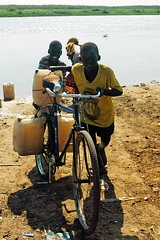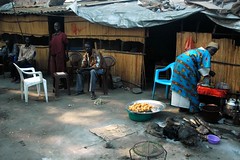The Perfect Balance
 Finding the right balance in life is so difficult to achieve that some people choose it as their sole undertaking in life. A common mistake made by many, though, is to think that the perfect balance is an absolute concept. It is not. The perfect balance is a moving target. That goal differs depending on where you live, what you do,.. Working in a remote location in South Sudan, today was one of those days where I felt that target was further away for me than ever.
Finding the right balance in life is so difficult to achieve that some people choose it as their sole undertaking in life. A common mistake made by many, though, is to think that the perfect balance is an absolute concept. It is not. The perfect balance is a moving target. That goal differs depending on where you live, what you do,.. Working in a remote location in South Sudan, today was one of those days where I felt that target was further away for me than ever.
Here is the deal: I am in charge of a humanitarian operation that covers an area in South Sudan which is five times the size of Denmark. The country is amazingly challenging with little or no infrastructure, and plenty of insecurity. Luckily, things only turn real bad during the rainy season. Unfortunately, the rainy season lasts an average of eight months a year.
The very few roads we have here are then impassable. The airstrips turn into mud and thus, become unusable. The country becomes one big swamp. It gets so bad, that one long sunny period is what most South Sudanese pray for. For those waiting for food aid and other relief items, it makes the difference between life and death. The floods destroy harvests and paralyze the little commerce that shyly emerges during the dry season. The conditions are so bad that some areas become impenetrable islands, with its inhabitants isolated for weeks on end. As a humanitarian worker it is already bad enough that you can not reach those in need, stuck on one of those “islands”. But it is even worse if you happen to be there during one of those rain storms. And you become one of the “Islanders” yourself…
This environment makes “finding the perfect balance” or rather “finding any form of balance” a daily challenge. Let me describe to you what happened today: “One day during the rainy season in Bor, South Sudan.” You start your day by taking a radio call from one of your food monitors out in the field, informing you the airstrip where we were to pick her up is not landable. And that she runs out of food supplies and water.
You start your day by taking a radio call from one of your food monitors out in the field, informing you the airstrip where we were to pick her up is not landable. And that she runs out of food supplies and water.
Another staff member calls in via the radio, asking for a tractor to rescue his vehicle stuck in the mud a hundred kilometres from his final destination.
While organizing help for the teams in the field, one of your staff kindly reminds you that he hasn’t been paid for the past two months which is quite common in a place where banks do not exist. His gentle reminder is accompanied by a look of annoyance from your security guards, who are still waiting for their new contracts and never miss an opportunity to remind you how good they really were with those AK47 machine guns before the South Sudan peace treaty was signed.
The worry for your life becomes second priority when a kind man tells you there are only five drums of fuel left to run the vehicles and generators, without which your operation will stop. This reminds you, you should really start working on finally getting your administration, finance and human resources assistants recruited. If you could find some time to start the process.
Ten minutes later, a Director General from one of the nearby ministries drops by your office asking for tents so he can relocate his flood-affected family to higher grounds.
While still keeping a smile and dealing with some of these adversities, you are suddenly reminded of an urgent need to go to the bathroom. The nearest latrine is two kilometres from your office, though.
“Never mind” you think, “Lunch time is few hours away. I will go then.” Meanwhile you stay away from fluids. Especially from the murky river water someone poured into the office water dispenser. *%$$£ !
That is about the time, you hear shooting in the vicinity of the office. As the UN security area coordinator responsible for the security of all staff, you are compelled to “do something”. Not too sure what, though. By 11 am, you remember the landlord wants to kick you out of your current office premises. And the governor wants to turn your best warehouse into a prison. Meetings must be held!
By 11 am, you remember the landlord wants to kick you out of your current office premises. And the governor wants to turn your best warehouse into a prison. Meetings must be held!
Just as you realize there is no vehicle to go for lunch (or the latrine!), you remember it’s Friday and your weekly reports are due.
While you try to forget the urgency of nature’s call, you are reminded by e-mail to do a bit of planning for the next food distribution. You are trying darned hard to figure out how on earth you are going to recruit forty people needed for that. Without administration, HR or finance assistants to help you out….
Before you know it, you realise it’s already six pm and mosquitoes will soon start looking for you. Then again, you remind yourself that as a humanitarian worker, suffering is part of the job. So you shrug and look one more time at your e-mail inbox trying to figure out which of the last fifty unread message deserves your attention.
Three of them catch your eye as the red exclamation marks indicate their high-priority. You open them up and they read:
- “The time for submission for the peer support focal point is due today”.
You think this would be ideal work for your HR assistant. If only you had one…. - “The deadline for the UN Online Training Module on Prevention of Harassment, Sexual Harassment and Abuse of Authority in the Workplace is due by the end of the month and is mandatory for all staff.”
You are glad that somebody reminds you of these important topics often overlooked by operational people. But then you remember that 60% of your staff is always in the field, distributing food in remote locations where even radio connectivity is a luxury. Let alone electricity or computers. So how can they do the training, which is only available online on the Internet? And what happens to the estimated 30% of your staff who only speak a local dialect, which unfortunately is not amongst the five United Nations’ official languages of the “Harassment Module”. And the remaining 10% of your staff are stuck in the mud of the rainy season somewhere waiting for you to pull them out. - “Next year’s budget submissions are due tomorrow.”
You know that you’ll never make it and without it, you know you are doomed.
 Your driver reminds you it is 8 pm and he is never been paid overtime. His calling awakens your bladder and reminds you of the curfew. You need to get going. You are cheerful, though, because tonight at least you have a driver. You get a lift to your living compound and are welcomed by a call for dinner. Ugali and beans. Again. You look at the food, take your plate to your tent, sit down and force down a few bites. You switch on your laptop, the custodian of hundreds of unread messages. Soon the frogs’ choir and bats hitting your tent imply that midnight is near… Yawn… You stand up and stretch.
Your driver reminds you it is 8 pm and he is never been paid overtime. His calling awakens your bladder and reminds you of the curfew. You need to get going. You are cheerful, though, because tonight at least you have a driver. You get a lift to your living compound and are welcomed by a call for dinner. Ugali and beans. Again. You look at the food, take your plate to your tent, sit down and force down a few bites. You switch on your laptop, the custodian of hundreds of unread messages. Soon the frogs’ choir and bats hitting your tent imply that midnight is near… Yawn… You stand up and stretch.
Wait! One more message to read. Your wife and kids remind you how much they miss you and that your place is at home, in Rome, with them. You are about to reply, telling them that your supervisor asked you to postpone your leave due to an unplanned emergency but that would be too much in one day.
Just after midnight, you switch off the light and promise yourself that the following day you’ll figure out the meaning of all this… And that you will soon find “a better balance”.
Story by Enrico Pausilli, edited by “E” and Peter Casier
Pictures courtesy Ulrik Pedersen
Continue reading The Road to the Horizon's Ebook, jump to the Reader's Digest of The Road.
 Peter. Flemish, European, aid worker, expeditioner, sailor, traveller, husband, father, friend, nutcase. Not necessarily in that order.
Peter. Flemish, European, aid worker, expeditioner, sailor, traveller, husband, father, friend, nutcase. Not necessarily in that order.
0 comments:
Post a Comment